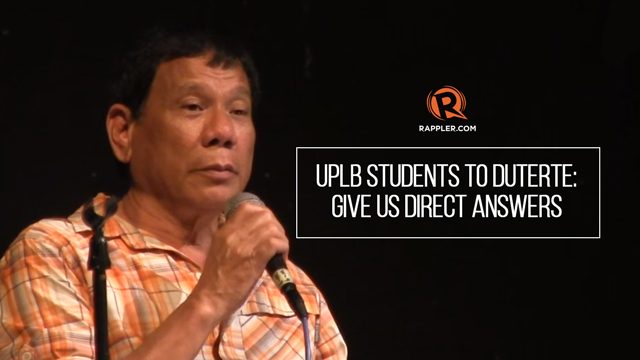SUMMARY
This is AI generated summarization, which may have errors. For context, always refer to the full article.

Unless we have become so accepting of cheap political point scoring as the main game in our public conversations, demanding presidential candidates to directly answer simple questions should be a welcome development in an election season that has been reduced to festivals of self-aggrandizement.
And so it was refreshing, when, once again, students of the University of the Philippines-Los Baños made sure that the presidency cannot be won simply on the basis of money, spin and soundbites. Reason can play a role during the campaign season too.
UPLB has started a tradition of roasting presidential candidates. Last September, in the first Governance, Transparency and Social Transformation forum, UPLB students set the tone for asking tough and confrontational questions to presidential candidates. In my previous piece, I wrote about the case of third year agriculture student Lucky Patrick Lopez who left Vice President Binay with no choice but to admit that there continues to be informal settlers in Makati.
“Mga 3% or 5% lang ang informal settlers sa amin sa Makati,’ Binay said. ‘E di meron sir, sabi niyo wala,” Lopez replied.
Confronting the Punisher

This time, all eyes are on student Stephen Villena, a student who asked Davao Mayor Rodrigo Duterte about how precisely he plans to fund peace and order programs – the centerpiece of his platform – if he declares education, agriculture and health as his top three budget priorities. Villena asked:
“Paano niyo maiimplement yung ginagawa niyo po sa Davao City na ganoon kaganda yung mga kagamitan ng mga kapulisan natin sa buong Pilipinas without compensating [sic] education? Or without increasing the budget of defence? Yun lamang po.”
Duterte started his response with an anecdote about the bombings in the Davao Cathedral and airport. Villena then interrupted the mayor, knowing that forum is running out of time. The mayor, they were informed, had to leave soon because he had to take a helicopter out before sunset.
“Sana po paki sagot yung tanong ng diresto kasi yung tanong ko lang po hindi po ba madadagdagan yung budget for defence kung maiimplement yung ginagawa niyo sa Davao City sa buong Pilipinas if ever you will be the President so sana pakisagot lang po ng diretso kasi nagtatanong po kami ng diretso dito para makauwi na po kayo.” (WATCH: UPLB students to Duterte: Give us direct answers)
To this, Duterte replied. “But I told you, the biggest budget will go to education then sabi ko agriculture, then health. What more can I say?” He added, perhaps in jest, “E kung gusto niyo bomba na lang.”
What about civility?
Villena’s demeanor has become the subject of heated debates about the ethics of engaging in discussion with presidential candidates. For some, Villena was disrespectful for interrupting the mayor a number of times instead of patiently waiting for him to get to the point. Others described his tenor as arrogant and too aggressive. His line of questioning was unbecoming of a scholar whose tuition fees are shouldered by Filipino taxpayers. For Duterte, the student was being a ‘smart aleck’ who got his facts confused. For some, Villena’s actions were so reprehensible that he deserved a Facebook page calling for his death. (READ: #AnimatED: Online mob creates social media wasteland)
Indeed, political conversations only work when there are basic standards for civilized discussion. A good public conversation is one where reasons and ideas are exchanged, instead of pie in the sky promises, threats and malicious propaganda. Keeping an open mind, the willingness to listen and seriously considering others’ views are essential components of democratic life, as it is these virtues that allow us to deepen our understanding of our differences, and, hopefully, find ways to manage conflict.
But what about politeness? Can a student ever justify rudely interrupting a presidential candidate?
Politeness versus interruption
Politeness and confrontational speech are not inconsistent virtues. Politeness serves as the basic virtue that binds conflicting parties to say I may not agree with you, but I recognize your status as a fellow citizen deserving of esteem and civilized treatment.
But sometimes, breaking away from the ‘gentlemanly rules’ of discourse can make our political conversations more inclusive. Rodrigo Duterte himself has become the personification of this virtue. Duterte’s biggest contribution to the campaign season, for me, is his ability to expose the hollowness of smooth talking politicians and show how candor, sincerity and the use of everyday language in political speech can change the course of the presidential race. Duterte’s tough talk and cursing spree interrupted a hackneyed Presidential race and set the stage for millions of voters feeling energized with a candidate who can give voice to their frustrations.
This is precisely the logic of interruption that we also need from ordinary citizens. The politics of interruption is crucial in an election season where most candidates seem to dodge the responsibility of giving precise answers to specific questions. Interruption, while usually impolite, allows the public to take over the political conversation and break away from candidates’ preferred mode of speech – whether it is Duterte’s proclivity for long unstructured speeches, Mar Roxas’s use of statistics, Grace Poe’s appeal to emotions and Jejomar Binay’s deflection of corruption accusations.
We need more interruptions, not less. We need more citizens who have the intuition to ask “but how” to a politician’s “I will.” We need more citizens who can interrupt a candidate on the verge of flip flopping and say “But that’s not what you said last time.” And we need more citizens who can puncture candidates’ delusional self-belief when diagnosing social issues and ask “but what did you do about it when you were in power?”
Interrupting candidates – whether it is through confrontational questioning in forums, tweeting critical views or creating playful but punchy political memes – have the potential to recalibrate relationships of power.
Presidential candidates may have the power to make audiences wait in forums or have the option to not show up in debates. But once they subject themselves to the scrutiny of critical citizens, interruptive politics can unpack rhetoric and identify which candidates are taking us out for a spin. It is through interruptive politics where these forums can be the space not to humiliate candidates but to expose their character and their wherewithal to thoughtfully engage their critics.
I have high expectations that the next presidential debate takes after the confrontational line of questioning we witnessed in UPLB, and not a beauty pageant where random questions are drawn from a fishbowl.
Our obligations
However, as citizens, we should also do our homework. We should also acknowledge that we could be better at asking questions, to frame them succinctly and, if possible, back them up with evidence. We, too, have the obligation to fact check our assumptions, to carefully choose our words so we can enrich rather than derail the discussion and to keep our eyes on the ball: that we are interrupting politics as usual so our democracy can be better.
I eagerly await candidates Roxas, Poe and Santiago to face the confrontational students of UPLB and other universities, in the same way I eagerly await students to keep getting better at shaping the course of the presidential elections. – Rappler.com
Nicole Curato is a sociologist. She is currently a research fellow at the Centre for Deliberative Democracy and Global Governance based in Canberra. Follow her on Twitter @NicoleCurato
Add a comment
How does this make you feel?
There are no comments yet. Add your comment to start the conversation.